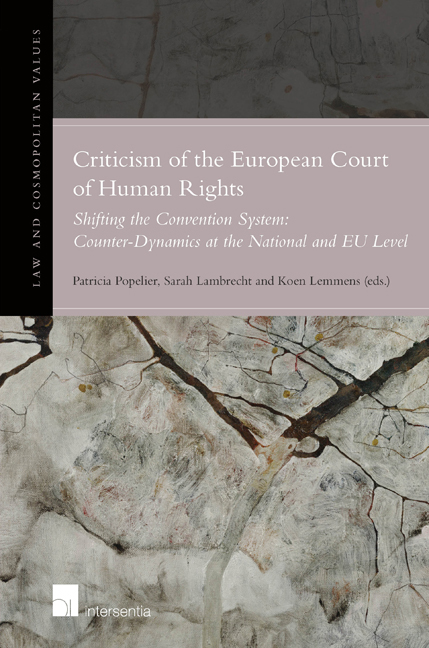 Criticism of the European Court of Human Rights
Criticism of the European Court of Human Rights from PART III - MODERATE CRITICISM
Published online by Cambridge University Press: 13 December 2017
Turkey's relationship with the European Convention on Human Rights (ECHR) goes hand in hand with the country's bid to join the European club. This bid shapes the attitudes of almost all circles in the country towards the ECHR. Turkey was founded on the ruins of the theocratic Ottoman Empire in the early 1920s. The founders of modern Turkey launched a modernisation campaign based on the western values of secularism, democracy and rule of law. With the idea of creating a modern public society, an extensive reception of western law was launched and conceived of as an instrument of social transformation. As such, an apparent conflict arose between traditional law and the needs of the society in so far as it aspired to organise itself by western standards and values. At the opening ceremony of the Ankara Law School, the founder of the Republic Mustafa Kemal stated: ‘We are attempting to uproot the old principles of law by formulating completely new laws. We are establishing these institutions to educate a new generation of jurists from the very beginning with new principles.'
During the Second World War, the young republic struggled with economic and political turmoil, which pushed the country to remain neutral in the war. Political developments on the European continent and in Turkey following the end of the war overlapped. Turkey held its first multi-party general elections in 1946 while Europe was working on establishing a system that could guarantee a permanent peace on the continent. When ten countries established the Council of Europe (COE) with the Treaty of London on 5 May 1949, the new Republic saw parallels between the founding principles of the COE and the Republic. Being a member of the COE was seen as another step forward to further establishing the European lifestyle in the country. On 13th April 1950 Turkey became the thirteenth member of the COE. This early membership places Turkey among the founding members of the Council.
While Turkey has been defining and refining its identity in the eyes of the Europeans, being a party to European human rights instruments is seen as sine qua non in the construction of its European identity.
To save this book to your Kindle, first ensure [email protected] is added to your Approved Personal Document E-mail List under your Personal Document Settings on the Manage Your Content and Devices page of your Amazon account. Then enter the ‘name’ part of your Kindle email address below. Find out more about saving to your Kindle.
Note you can select to save to either the @free.kindle.com or @kindle.com variations. ‘@free.kindle.com’ emails are free but can only be saved to your device when it is connected to wi-fi. ‘@kindle.com’ emails can be delivered even when you are not connected to wi-fi, but note that service fees apply.
Find out more about the Kindle Personal Document Service.
To save content items to your account, please confirm that you agree to abide by our usage policies. If this is the first time you use this feature, you will be asked to authorise Cambridge Core to connect with your account. Find out more about saving content to Dropbox.
To save content items to your account, please confirm that you agree to abide by our usage policies. If this is the first time you use this feature, you will be asked to authorise Cambridge Core to connect with your account. Find out more about saving content to Google Drive.